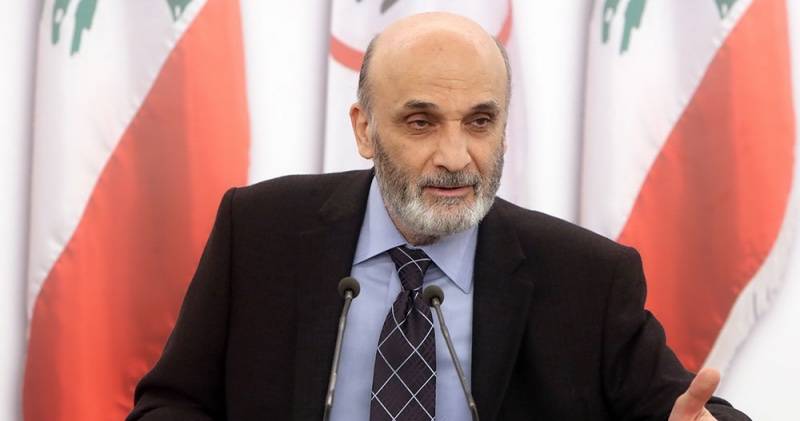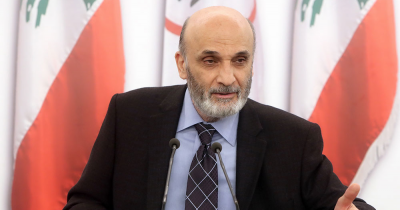
Lebanese Forces leader Samir Geagea. (Credit: NNA)
Lebanese Forces (LF) leader Samir Geagea said on Saturday that Hezbollah, which has been engaged in deadly fighting on the Lebanese-Israeli border since the start of the Gaza war last October, must withdraw to the interior of the country and make way for the Lebanese Army. These comments were quickly criticized by the Jaafarite mufti, Ahmad Kabalan, who is close to Hezbollah and the Amal Movement.
"Hezbollah is incapable of defending Lebanon. The solution is for the Lebanese Army to deploy on its own to every point where the Shiite party is located, and for it to withdraw to the interior of the country as a first step," Geagea said at the launch of a "national meeting" entitled "The 1701, to defend Lebanon" at his party's headquarters in Meerab.
After the meeting, to which several parties and parliamentarians were invited, opposition MP Waddah Sadek read a closing statement. It "calls on the government to implement resolution 1701 and immediately order the deployment of the Lebanese Army south of the Litani River and along the Lebanese-Israeli border."
UN Security Council Resolution 1701, adopted during the July 2006 war between Israel and Hezbollah, explicitly empowers the United Nations Interim Force in Lebanon (UNIFIL) and the Lebanese Army to operate and maintain peace along the so-called Blue Line, which demarcates the border with Israel. It also provides for Hezbollah to be kept away from the border in exchange for Israel's respect for Lebanese sovereignty.
"The possession of weapons outside state institutions, in particular the army, is a threat to Lebanese sovereignty, whoever is in possession of them and whatever the causes,’ Sadek added. ‘The Lebanese Army enjoys the confidence of all Lebanese. It is up to the army to protect Lebanon's borders and sovereignty against any foreign aggression, especially from Israel," he said.
'Throwing a people into war'
In his speech, Geagea also said that "what Hezbollah is doing in the south has not served Palestine and has even harmed it."
"All the military operations carried out in southern Lebanon have not helped Gaza. On the contrary, we have suffered loss of life and many villages have been totally or partially destroyed," the Christian party leader said. I would have liked Iran and Hezbollah to occupy Tel Aviv, but that's impossible," he added.
Geagea also pointed out that "the military operations in south Lebanon were launched on the decision of Hezbollah alone, and the government took no decision in this regard."
"No party has the right to throw a people into war," he said. "We support the Palestinian cause, but we are against those who profit from it," he went on, while calling on the outgoing government and Parliament to "assume their responsibilities" regarding the situation in south Lebanon.
‘Our meeting serves to put in place a roadmap to try to avoid a war in Lebanon, and to insist on the need to implement resolution 1701’, Geagea stressed on Saturday. ‘The Lebanese people, and the inhabitants of the south in particular, who are led to believe by Hezbollah that it can reach Jerusalem in two minutes, are paying the price for the presence of an armed arm of Iran in Lebanon,’ he added.
Kabalan speaks out
Mufti Kabalan was quick to react to the remarks made by the head of the Lebanese Forces and to the Meerab meeting, which he described as a "betrayal." The application of ‘resolution 1701 must begin with the condemnation of Tel Aviv and not by tightening the noose around Beirut and the guardian of national sovereignty. The army is a partner [of Hezbollah's resistance] and is present everywhere in Lebanon," Kabalan said in a statement quoted by the Lebanese state-run National News Agency.
He also accused "those who insist that 1701 should first be applied in Beirut of being halfway, and without knowing it, with Tel Aviv."
"Any gathering or stance that undermines Lebanon's strength and resistance finds Israel halfway there, even if that is not the objective,’ he added. Kabalan asked, "Was the Meerab meeting held in the interests of Lebanon or Tel Aviv?"
The Jaafarite mufti described the Meerab state as "very dangerous because it goes beyond the red lines of national interests … and attacks sovereignty, civil peace and the national pact."
"A liberated Lebanon [from Israeli occupation] is attached to the arms of the resistance and its sacrifices, not to those who took part in the occupation [of Lebanon]," he added, in an allusion to Hezbollah's accusations that Geagea collaborated with Israel during the Lebanese Civil War (1975-90).
Presidential election and Syrian refugees
The LF leader also touched on two other issues: the presidential election — the office of the president has been vacant since Michel Aoun's term expired in October 2022 — and Lebanon's porous border with Syria.
"The moumanaa [pro-Iranian] axis paralyzed the presidential election. There is no longer a state in Lebanon, but a state within a state that monopolizes decisions on defense strategy and legalizes illegal crossing points on the eastern border [with Syria]," Geagea said. "We are facing a mini-state that monopolizes military decisions in Lebanon. There are around 25 illegal crossing points [along the border with Syria] and it was through these that Pascal Sleiman's remains passed [into Syria]," he added.
Pascal Sleiman, a Lebanese Forces official in the Jbeil region, was killed and taken to Syria on April 7 by a Syrian gang of car thieves, according to the Lebanese Army. His remains were subsequently handed over to his family in Lebanon.
The final text of the Meerab meeting calls for "tighter control of the border with Syria and implementation of the agreement for the return of Syrian refugees to their country."
Geagea's comments come as tensions between Syrians and Lebanese rise at a time when the authorities are insisting on the repatriation of Syrians. On Friday, caretaker Prime Minister Najib Mikati denounced "a desire to hinder the voluntary return to Syria" of certain "displaced persons … on the pretext that there are no safe zones" in their country.
